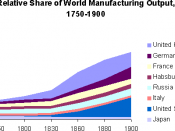The industrial revolution in Britain was a long and gradual development. The favorable conditions in England were why industrialization took place earlier and faster than other countries at the time. At the time, England was the dominant power of the Atlantic economy, with a large colonial empire. The lack of physical barriers and the many canals and water links helped with transportation of goods. Coalfields and thick forests, located close to large deposits of metal ores, provided fuel to power the furnaces that produced iron (Kreis). Thriving central and commercial banks provided financing for investments in industrial plants and machinery. Advances in agriculture also contributed to the industrialization process. Beginning in the mid-17th century, England underwent a process of agricultural improvements that enabled fewer farmers to feed more people while cultivating the same amount of land. Agricultural improvement not only produced more food at cheaper prices, it also allowed farms to produce more food with fewer workers (Kreis).
Workers who could no longer find work on farms migrated to the towns in search of employment. As a result, there was a dramatic shift in population during the 19th century from the agricultural southeast to the inner cities of the north, where industry was located.
In this first phase of industrialization, workers were unprotected by social legislation, and even efforts to eliminate child labor met serious opposition. Few safety regulations existed, and large numbers of women, children, and orphans were used and abused in the system. In years of poor harvests, low investment, or economic slump, there was great misery among the poor. Disease ran through the overcrowded towns like wildfire. "Their houses [were] built so that the clammy air [could not] escape. They [were] supplied bad, tattered, or rotten clothing, adulterated and indigestible food" (Smith, 41). To escape these hardships,


